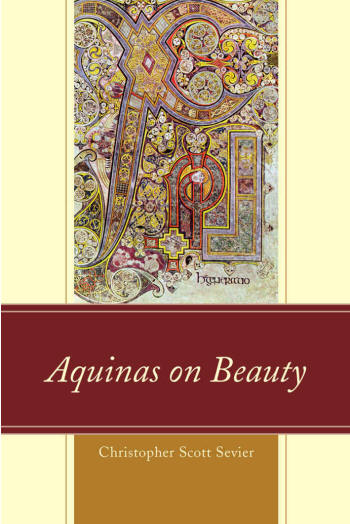Book Review
Aquinas on Beauty
Christopher Scott Sevier
Lexington Books 12 Feb 2015
ISBN:
978-0739184240
 What
has beauty to do with ethics? A great deal according to Thomas Aquinas,
says the author of this excellent read. For Aquinas, as for all the
philosophers of his day, beauty is an objective reality. But Aquinas also
introduced a subjective element which was not apparent to the other
philosophers. Beauty for Aquinas is not primarily something physical but
is moral and intellectual. As a theologian, Aquinas also claims that God
is beauty and is the cause of all beauty in the world. The way of beauty
is a way to God.
What
has beauty to do with ethics? A great deal according to Thomas Aquinas,
says the author of this excellent read. For Aquinas, as for all the
philosophers of his day, beauty is an objective reality. But Aquinas also
introduced a subjective element which was not apparent to the other
philosophers. Beauty for Aquinas is not primarily something physical but
is moral and intellectual. As a theologian, Aquinas also claims that God
is beauty and is the cause of all beauty in the world. The way of beauty
is a way to God.
The author explains that desire is not what moves us
to do good. It is true that we take pleasure in things apprehended as
good. But pleasure is not the good: it is the soul's response to goodness.
We have a natural desire for the beautiful and the good and when we pursue
them we experience pleasure. Hence the close link between ethics and
aesthetics for Aquinas.
The author notes that, for Aquinas, we can train ourselves to desire the good by habituation and we can also train ourselves to hate false goods. We are morally responsible to desire good things and they will bring us pleasure. If, however, we follow false paths, we habituate ourselves to see evil as beautiful and, in consequence, we have less pleasure upon seeing the beautiful and the good. Taking pleasure in doing evil will make us see less beauty in doing good.
For Aquinas, beauty is primarily a spiritual reality and is therefore that much more difficult to apprehend. Theological truths are beautiful and difficult to apprehend. Aesthetic pleasure is what we experience upon perceiving beauty, in apprehending clarity and due proportion. The author shows us that Aquinas distinguishes sensory from spiritual pleasure: pleasure that is sensory disappears once the object is attained whereas spiritual pleasure increases through possession of the object. Improper pleasure destroys the virtue of prudence which directs us to act reasonably in a given situation.
From all this, it becomes clear why the author argues that aesthetics is a sub-division of ethics for Aquinas. If we conceive morality in terms of human flourishing, then cultivating love for beauty becomes a moral imperative.
My first reading of Aquinas on beauty was in a book by Umberto Eco. But Eco believed that the aesthetics of Aquinas is of little value in our age. Sevier argues otherwise and does so with clarity.
Reviewed by Dr Pravin Thevathasan
